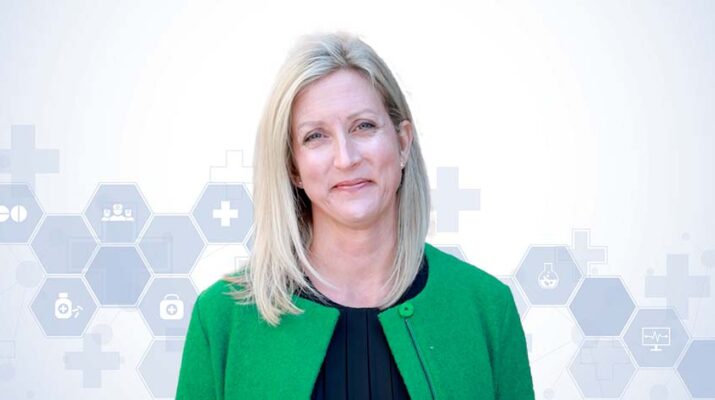By Mike Costanza
CEO of NAMI Rochester talks about mental health, addiction, suicide prevention and ways her nonprofit is helping the community. She says demand for service is growing steadily
NAMI Rochester offers peer support programs and educational courses to those affected by mental illness and their loved ones.
The nonprofit, which is part of the National Alliance on Mental Illness, served close to 3,000 people last year, a great increase over the average 2,200 it served annually pre pandemic.
It has just six employees, about 60 active volunteers and a current budget of $430,000. In Good Health spoke to CEO Heather Newton about NAMI Rochester’s programs and challenges.
Q: What is NAMI Rochester’s purpose?
A: Our mission is to provide support, training and advocacy around mental health for our community. Our primary audience is people who are seeking support in a nonclinical setting. We’re a community-based organization and we’re advocates. Nothing we do is clinical.
Q: How is NAMI Rochester different from other nonprofits that support those who have mental health conditions?
A: Whether you work here or whether you are a facilitator for one of our programs, you had a mental health story in the past or one that you are working through now, and you are using that experience to help and support other people through very similar experiences.
Q: Could you tell us about some of your nonprofit’s support programs?
A: We have support groups that are for peers and run by peers. Some of those people have a diagnosis and some of those people do not have a diagnosis. That is irrelevant to us. If you feel that you need support around your own mental health condition or if you are supporting a family member or friend who has a condition, we are here to help. You can come anytime. We want you to come when you need support.
Q: Some people living in the Rochester area have specific needs that general support groups might not meet. How does NAMI Rochester help them?
A: We have more specific support groups for particular groups in the community that have come to us. For example, we have a group called Warrior Moms that is specifically for moms who are supporting their children who live with mental illness or a co-occurring substance use disorder. We have similar groups for dads, senior citizens, LGBTQ, and for Black and brown men. We also have a group for those who have lost someone in their life to addiction—meaning overdose—and for those specifically who have lost someone in their life to suicide. It’s called the Suicide Loss Bereavement Group.
Q: Why is it important to focus upon suicide prevention?
A: When you talk about mental illness you must also include conversations about substance use disorder, meaning addiction and suicide prevention. You cannot untangle mental illness, substance use disorder and suicidal thoughts and actions, they’re inextricably linked. We also oversee the Monroe County Suicide Prevention Coalition. We get together other community members and organizations who are interested in the ways we can reduce the suicide numbers in the community.
Q: Does NAMI Rochester also offer educational programs for peers?
A: Those are eight-week programs where folks are welcome to sign up. Those educational programs get a little bit more in depth in terms of brain health and brain science. They are two-and-a half hours for eight weeks in a row. So you really need to be at a point in your life where you feel like you can do that.
Q: NAMI Rochester received a $12,500 pilot grant from the Suicide Prevention Center of New York for developing a countywide LOSS Team. What is a LOSS Team?
A: That acronym stands for “Local Outreach to Suicide Survivors.” It’s based on a national model called the LOSS Team model. The team is made up of people who have experienced a loss in their family by suicide. Those people are acting as peer support for people who have asked for that support. They would be the family members or loved ones of those who have died by suicide. We have this dedicated phone line where we’re dispatching these folks.
Q: As part of its outreach efforts, NAMI Rochester has passed out “resource cards” in the community. What are they?
A: Our pocket-sized resource cards provide free local resources for individuals and their families who are in need of mental health support. The cards list brief descriptions of local resources, as well as their phone numbers and websites. The cards contain 24/7 hotline information as well as local supports for peers and family members. In addition to NAMI Rochester, some examples of resources listed are: 211/LIFE LINE, the Rochester Regional Health Behavioral Health Access and Crisis Center (mental health urgent care), Self-Help Drop-In Support Services, the Veterans’ Outreach Center, ROCovery Fitness, Trilllium Health, St. Joseph’s Neighborhood Center and Compeer Rochester.
Q: Where have you distributed the cards?
A: Since March 2020, we have produced and distributed more than 35,000 cards to first responders, clinics, therapists, restaurants, coffee shops, barber shops, salons and other community locations to educate our community about the free mental health supports available to them.
Q: How has the COVID-19 pandemic affected the demand for NAMI Rochester’s services?
A: I have more people seeking more intense support, more frequently coming to support groups and more frequently calling out for help.

